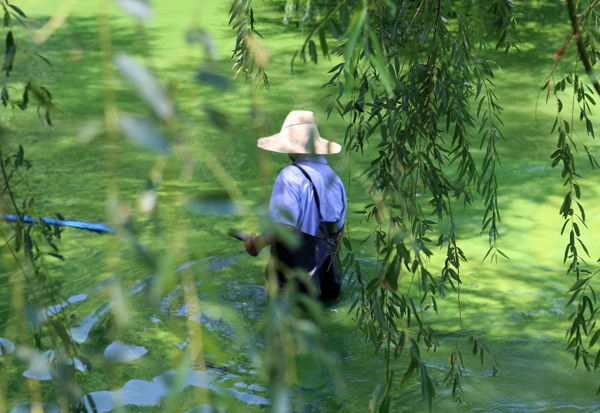 |
|
Foul-smelling blue-green algae blanketed a large swathe of the 2,338-sq-km Taihu Lake in August 2012. Provided to China Daily |
It's now illegal to discharge untreated sewage water into the lake, and the thick layer of algae has all but disappeared. Visitors arrive in droves to admire the vastness of the lake.
The change has been dramatic, according to Zhang. Maybe not every family was happy with the relocation program, although it's a hot topic in areas all over China, but "the consensus is that the environment has improved greatly and that will benefit everybody," he said.
The problem of water pollution has risen in tandem with China's rapid urbanization and industrialization as the country's economic growth soared. Official figures indicate that there are roughly 1,700 water-pollution accidents every year and as many as 40 percent of the country's rivers are seriously polluted.
In recent weeks, thousands of rotting pig carcasses, believed to have been dumped by villagers upstream in a bid to avoid the high cost of disposal, have been found floating in Shanghai's Huangpu River, threatening the safety of the water supplied to millions of city residents.
About 130 km away in Wuxi city, Jiangsu province, a massive outbreak of algae on Taihu Lake in 2007 left millions of residents without tap water for a week.
Only in recent years have the harsh lessons learned from incidents such as this prompted residents to take water conservation seriously. Everyone was jolted into action to save the environment and the gifts of nature that had been taken for granted for so long.
China's economic liftoff guaranteed local governments more cash and leeway when they stepped up their clean-up efforts and the fight against pollution.
Following the 2007 water supply crisis, Wuxi, which sits on Taihu's northern shore, injected tens of billions of yuan into pollution control and improving the aquatic environment. The heavily industrialized city has closed or relocated more than 2,000 high-polluting or high-energy-consuming enterprises from the areas surrounding local lakes and rivers since 2007.
A sewage pipe network has spread across the urban area and most of the rural regions, channeling waste into plants where it is treated before being allowed to flow into the lake.
In addition, the city authorities set up a team of 1,000 members to scoop the blue-green algae from the surface of the lake during the summer, the main season for outbreaks, and recycle it as an energy source - dried algae burns easily - or as a fertilizer.
The measures have seen the frequency of the outbreaks decline every year, according to Wang Hongyong, director of the Wuxi Water Conservancy Bureau. The duration of the outbreaks has also been shortened; in years gone by they began as early as April, but now they occur later in the year and the area of water affected has shrunk, he added.
Related:
|
|
|
|
|
|
|
|
